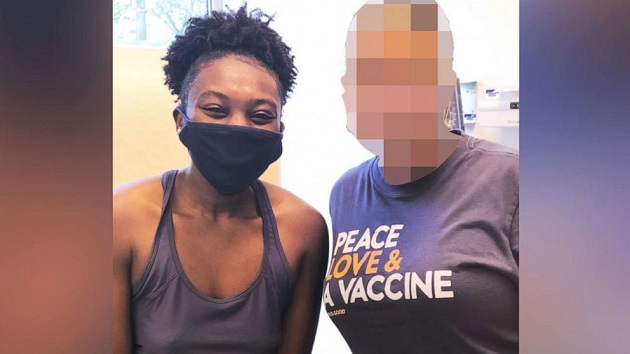
Courtesy of Sophia Upshaw
Courtesy of Sophia UpshawBY: JENAE BARNES, ABC NEWS
(NEW YORK) — Sophia Upshaw was one of two Black participants in Moderna’s first 45-person COVID-19 vaccination trial.
Now, Upshaw is sharing her experience and has a message for the Black community: The vaccine is safe.
“I was scared at first, for my health [and] for exposing myself to something that hasn’t been tested in humans before,” she said. “I was technically patient No. 10.”
As her hometown of Atlanta was being hit hard by the virus, Upshaw decided to participate in Moderna’s first vaccination trial at Emory University on March 16. As a Ph.D. student of biomedical engineering there, she was excited to be a part of scientific history.
“This vaccine is the first one ever made with mRNA, or messenger RNA, and it’s the first time it’s been put in humans ever, in the history of the world,” she said. “I was geeking out about it.”
Moderna, an American pharmaceutical company, is one of the front-runners in the race for a COVID-19 vaccine. The current phase 3 trial is slated to enroll 30,000 people; however, only about 19% of Moderna’s study is comprised of Black or Hispanic volunteers. Pfizer, another company with a late-stage trial, said roughly 19% of its volunteers are Black or Hispanic and about 4% are Asian.
It’s not enough, according to health officials.
“I would like to see a percent enrollment commensurate with the percent represented in society,” Dr. Anthony Fauci, the nation’s top infectious disease doctor, told ABC News. About 40% of the nation is non-white, according to the most recent census data.
“Optimally, although it might be difficult to attain, I would like to see a number somewhat greater than this and approaching the percentage of disease,” said Fauci, who explained that minority groups struck by the pandemic should ideally be overrepresented in vaccine trials, to ensure one works in those who may need it the most.
As a scientist, Upshaw knew the importance of vaccines to create preventative health measures, but as a Black woman, it held personal importance. Black Americans continue to fight two pandemics — racism and COVID-19 — but the race toward a vaccine connects them. While COVID-19 decimates the Black community, the nation’s history of non-consensual medical experimentation on Black Americans has instilled wide mistrust of the vaccine.
Upshaw is keenly aware of this conundrum. She hopes her positive experience in Moderna’s study will offer the Black community a relatable perspective, potentially encouraging others to volunteer for a trial.
“Honestly, they have a valid reason not to trust the medical community because of its horrible past like the Tuskegee trials, HeLa cells,” said Upshaw, referring to two infamous case studies of unethical scientific experiments in which researchers did not obtain consent from Black patients.
These historical injustices inspired massive reform in the medical industry today, including implementing safety regulations and mandatory ethical reviews of scientific studies.
Still, said Upshaw, “it’s going to take a long time to repair that damaged trust between the two communities. This is an opportunity to repair that damage and build up some trust. I’m hoping my story will inspire Black people to take the vaccine when it comes out.”
Dr. Asefa Mekonnen, an investigator for Meridian Clinical Research, has been encouraging minorities to trust and participate in Moderna’s phase 3 vaccination trials administered by his hospital.
“People always mention the historical past missteps in science, but today we’re in a different situation,” he said. “There is a huge knowledge gap in terms of what vaccine trials are, what are their purposes, and how they are conducted.”
Initially, Upshaw admitted she was scared and her family thought she was “insane” for participating in the trial. But her fears subsided as she only experienced common vaccine symptoms, including muscle soreness, fatigue and a slight fever that lasted two to three days. The entire process took about two hours of her day and she had follow-up doctor appointments to monitor her response. Since then, she’s tested negative for coronavirus and developed COVID-19 antibodies.
As a scientist herself, Upshaw is dismayed to see the way Black celebrities, like musician Trey Songz, have used their influence to discourage their followers from taking the vaccine. For Upshaw, Songz’s Instagram post was the last straw that inspired her to speak out about her experience.
“It’s discouraging to see a lot of Black people who look like me pre-declare that they won’t get the vaccine when it comes out,” she said. “It discourages me because our people are being disproportionately affected by it.”
Songz did not respond to ABC News’ request for comment.
But her message is simple: Vaccines are safe. She hopes people that look like her will trust her experiences and the science behind the COVID-19 vaccine.
“As an influencer, what you say influences how people conduct themselves and what they do,” she said. “I’m not a celebrity, but I hope people can take my story into account. Listen to voices of reason, not voices of dissent.”
Upshaw rejects common perceptions that young people do not need to get vaccinated because they may be at a lower risk of being infected with the virus. The World Health Organization has warned that young people are emerging as a main spreader of the coronavirus.
“I’ve had people ask me, ‘Why would they test this on a 22-year-old?’ I think a huge purpose of the testing on younger people first was to confirm the safety even more before exposing older people to it. So that’s why they included 55 to 70-year-olds afterward,” she said.
She went on, “The fact is that every other young person is not completely immune. I think it’s very important for the sake of our communities and families that we are all protected.”
Moderna began the third phase of vaccination trials on July 27. Now, the race is on to ensure these larger phase 3 trials are as diverse as the country.
“I want people to know that if they can’t trust the government, that’s all right,” Upshaw said. “But please trust the science.”
Jenae Barnes is a freelance writer based in D.C. and a member of the National Association of Black Journalists.
Copyright © 2020, ABC Audio. All rights reserved.

